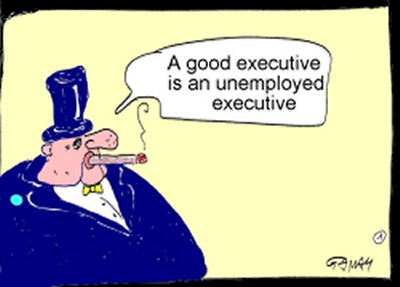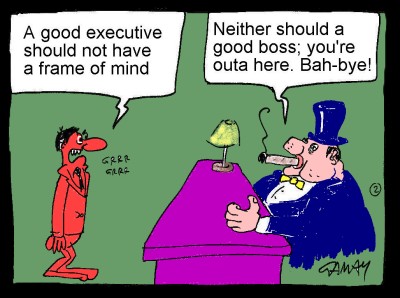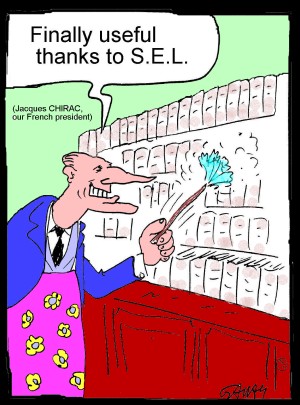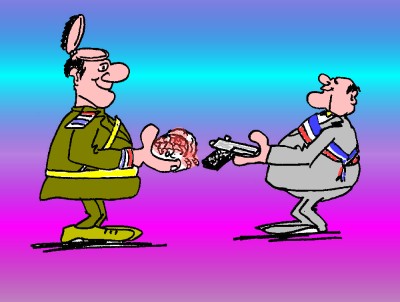|
When I decided to get
involved in LETS adventure, I adopted the same strategy as the head of a
company, carefully developing his project.
My professional
education was traditional. Graduated as a mechanical engineer in the
manufacturing industry, I enjoyed many satisfactions during my career, until the
first side effects of the economic crisis hit. I felt them in1992. I profited of
it to change my way of life and devoted myself to sports, leisure and cultural
activities (drawing, writing, etc.).
My last professional
experience was in January 1996. It was the worst possible thing that could
happen: the company, which employed me as a branch manager, recruited salesmen
without declaring them to URSSAF (Union for the Recovery of Social Security and
Family Allowances’ Contributions). No ASSEDIC (Organization Managing
Unemployment Insurance Payments); I was granted of no allowance since the
“experts” determined that my research of reintegration was not “sufficient”.
The reality is that I became typically depressed and I devoted
long, tiresome and expensive hours to write to fictitious employers who never
answered me. I became obsessed by getting money and I acted like a predator,
which seeks its food amongst other savage animals.
I had already created
two companies in my preceding "normal" life and I initially planned to create
another one. However, a detailed analysis of all the estimated income statements
always led me to lay down my pen, put my head between my hands and say to
myself: "it is imperative to wait".

As all of us, I imagined
another way of life, elsewhere, otherwise. I live in the Southeast of France, in
a splendid area, and I supposed I could settle in its splendid backcountry, to
live a life on breeding and culture, just as before.
I was there with my
reflections when in August 96, I watched a special report on TV about LETS.
Bingo! What I tried to imagine so vaguely, others had already carried out! At
the same time, I attended a three-day training course organized by the ANPE
(National Employment Agency) executives, intended to make a professional
assessment and to provide us with advanced technics to give us a realistic
social rehabilitation. I was acquainted with a company former head P…, 52 years
old who owned a printing works employing eight people and knew the vexations of
going into liquidations. Sympathetically, he explained to me that he belonged to
a “St Vincent de Paul” group composed of graduates and professional people,
everyone experienced executives. I jumped at the opportunity, and suggested to
him I would come to their next meeting to announce my project to them. My
intention was to test the credibility of a LETS program on men and women who
were the best qualified to judge its merit.
I remember preparing and
learning by heart the first three sentences of my speech:
"When a human being has
all lost and nothing remains to him, absolutely nothing, what is left over to
cling to life? He must assume his fundamental physiological needs, i.e. food,
clothing and shelter. From there, any individual will be able to preserve a
minimum of human dignity and exhibit competence in his professional field: money
is not essential in itself".
I delivered the theme,
before an audience of these well-educated managers with heads full of fine
knowledge issued of prestigious universities and colleges, knowledge, which our
community really does need anymore.
My talk was a complete
fiasco. My project was interpreted as an incitation to run a black market.
Perhaps I could not find
the right words to explain my concept.
Perhaps also, I did not
have the right audience…

At the end of October
96, there was a report on the TV channel "FR3 Côte d’Azur" concerning a stock of
exchanges (it’s a market where exchanges are done) organized by the LETS of the
Var (a department near Nice).
This time, I
go there alone.
I pick up
the phone to obtain the details of the person in charge of the LETS for the area
concerned, and I go and see him.
The guy whom
I meet is 50 years old; he is smiling with overflowing energy. He bombards me
with documentation: press articles, reports, and statistics on LETS, their
gazette, etc. I saw, read and listened a lot. The following day, I wanted to
materialize by writing my perception of the moment concerning the LETS. This
presentation dates from October the 31st, 1996, and here is the text.

October the 31st,
1996
BARTER:
1 - Direct Exchange of
one object for another.
2 - Economic System not
using currency. (Definitions of the Larousse dictionary of 1990.)
Swapping
dates back from the dawn of times. For a very long time, our ancestors
exchanged, bartered, haggled over, and negotiated. Money appeared only much
later and symbolized a social evolution.
During the
last two decades our society has developed to such a degree, that contractors
seeking inspiration, came up with a brilliant idea: to create franchise networks
in order to promote barter. This fabulous organization uses an accounting
document that is called "credit note".
So, does
barter mean regression or evolution of mentalities?
When a man
has nothing left, absolutely nothing, what is necessary for him to remain alive
and not to be excluded from society? He needs:
- food.
- clothing.
- shelter.
-
purpose/work.
- sound mind and
mental health in order to daily provide the above for oneself.
This message
is addressed to French people seeking to remain normal citizens and always
desirous of living in their country and defend its values.
When you
have nothing left, there is always something to do.
When Society
cannot provide any more for your fundamental needs, it is necessary to recreate
your own economic system so that the concept of Society can endure. And there is
nothing in particular to invent because all the elements are there, within our
reach and they have been existing for a long time.
Hundreds of
associations practising barter exist in the worldwide. In France, this system
has born two years ago. It is called SEL (System of Local Exchange).
When I
became aware of this system for the first time through journalists’ comments,
two expressions drew my attention: "parallel economy" and "primitive economy". I
do prefer the second. "They reinvent the primitive economy", said that eminent
professor, economy specialist in a famous national commercial school.
This
thinking process is primitive and therefore there is practically nothing new to
understand. In any case, nothing to see with a Machiavellian assembly designed
by a higher intelligence and intended to cause the destruction of the national
economic system.
Since we
spoke about fundamental needs, let us remain fundamental in our approach, and
primitive in our view and see very simply what are the principal scenarios of
barter.
An exchange
can be done:
First
case: Between two people only.
They need no
other structure. This practice is very current and concerns material, goods or
services.
Second
case: Between three people only.
The number
of services is multiplied by three. These three people well know each other well
and thus understand perfectly what are the gathered competencies.
Third
case: Between only four people.
The number
of services, which could be brought, is multiplied by 4 compared to the
preceding case and by 12, in comparison with the first case
Fourth
case: Between 50 people.
These people
are virtual strangers. A centralization of information becomes necessary if the
group is to operate efficiently. Accurate bookkeeping is highly desirable, as a
"currency" has to materialize and to spot the transactions. In fact, this
currency is called SEL and a grain of salt is worth one franc (0,15
euros) approximately. Its denomination has absolutely no importance, it is only
a symbol and has a value within the group constituted.
There is
there, no complexity. As in a traditional accountancy, the concepts of "credit
account" and "debit account" will be necessarily used. To avoid dispersions, it
will be admitted initially that an account cannot have a debit balance of more
than 2000 SEL (two thousand SEL). For the credit accounts: no limit. If I decide
to have ten million SEL, it is a matter, which concerns only me. It is obvious
to see that if I decide to invest these SEL in the real-estate business, my tax
collector will find nothing to say, the property developer will not agree and my
country’s economy will not be turned upside down.
The correct
run of this system depends mainly on the honesty expressed by each member. A
French stick of bread is worth 3,50F. One hour of plumber’s service is paid
190F, tax included. Does this mean then, that I spend one hour assembling a
bathroom tap for you, you should owe me 190/3,50 = 55 French bread sticks? In
such a system, the plumber would suffer from overfeeding and the baker would
take only one shower per week.
Then you
would think that only one loaf of French bread per day is enough for a human
being to survive.
You could
also say that if a destitute man was to find one hour of employment per day,
that man would survive.
Finally, you could think
too that a man completely dispossessed needs only one hour of occupation to get
alive.
In all
cases, it is better, at a psychological level, to exchange as in primary economy
than to be assisted in a very elaborate economy.
Well!
I timidly started to distribute this text around me
and I observed the people’s reactions during the reading. I limited myself to a
strict presentation without making any suggestion. The reactions were tepid.
As a result
of this lack of enthusiasm, the idea occurred to me to placard at all the
streets’ corners the following message:

S.E.L.
You can exchange:
- food.
- objects.
- a service.
- a
goodwill.
- a
presence.
If you have nothing of
that, there remain two solutions for you:
1) - to
commit suicide.
2) - to look
for assistance.
Anyway, this, is an
exchange however because:
1) - death
is an exchange with life
2) -
assistance is an exchange with… With what, by the way?
I never did it...
Thankfully, I have not
yet had to exchange one of these…

|